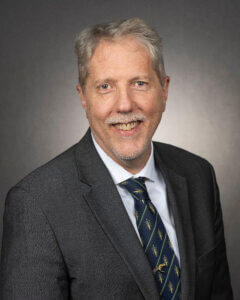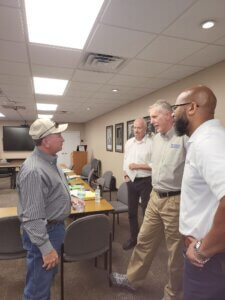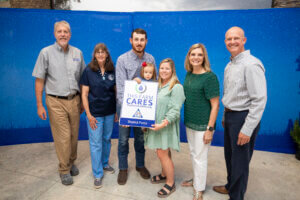August 2024 FloridAgriculture eNewsletter

By Rob Gilbert
[email protected]
@IFAS_VP
Mickey Diamond is a bridge between UF/IFAS and the Florida Farm Bureau Federation. He builds that bridge with service.
Part of that service is as your voice. He serves with straight talk. When I travel the state visiting our research centers, I always ask to meet with customers who know the center best. Invariably, those customers are local Farm Bureau leaders.
Diamond, a Santa Rosa County Farm Bureau board member, serves on the West Florida Research and Education Center (WFREC) Advisory Committee. It’s a group of committed volunteers who meet at the center to improve the science they deliver to producers.
For 10 years, he has served on the “Meet the Farmer” panel on the local chamber of commerce’s Agribusiness Day at WFREC. And he makes his own formal visits to query the staff on new peanut varieties, farming practices, or cover crops. The conversations revolve around sustainability – that is, how can a farmer stay profitable while faced with hurricanes, freezes, pests, diseases, volatile markets and labor shortages?
“The thing you got to do is you have to figure out if it’s cost prohibitive,” Diamond says. “There’s not a spare penny in it today.”
 That’s where knowledge comes in. Sometimes, it’s from our faculty who glean from data incremental ways to reduce costs or increase yields. Sometimes it’s wisdom from people like our farm manager Greg Kimmons, who brings 44 years of observations at WFREC to conversations with Diamond.
That’s where knowledge comes in. Sometimes, it’s from our faculty who glean from data incremental ways to reduce costs or increase yields. Sometimes it’s wisdom from people like our farm manager Greg Kimmons, who brings 44 years of observations at WFREC to conversations with Diamond.
Attending meetings with scientists comes at a cost. As Diamond said, “A lot of times we can’t just drop and go. Ain’t nobody else to do it (work the farm) but us.”
That’s why I appreciated the opportunity to meet Diamond last month at WFREC.
Not only does he serve the center, but he inspires us to step on the gas as we seek the innovations that will keep you profitable. Frankly, Mickey is hard to keep up with.
He’s been using cover crops and strip tilling since the early 1990s. And his equipment is better than what we have at our underfunded center in Jay. He’s an example of what has inspired me to seek funding from the legislature in 2025 to buy state-of-the-art equipment for our centers across the state. Up-to-date equipment is critical for our ability to demonstrate what works on the farm with today’s tools, not those of 10 or 20 years ago.
Diamond exemplifies how advances in agricultural science come from a partnership between farmer and scientist. He runs real-world trials on his own land that parallel the carefully controlled experiments we do at WFREC. He gives us feedback on the cotton and peanut varieties he plants. And he serves as your voice, letting us know about what challenges you face every day as you plow, plant, irrigate, protect and harvest.
He has been doing this a long time. He was the 1996 Young Farmer & Rancher Achievement Award winner. He long ago won FFBF’s CARES award for environmental stewardship.
With his service, he’s helping create the conditions for his fellow farmers to keep producing food, feed, fiber and fuel for a long time to come.
Rob Gilbert is the University of Florida’s interim senior vice president for agriculture and natural resources and leader of the UF Institute of Food and Agricultural Sciences (UF/IFAS).

